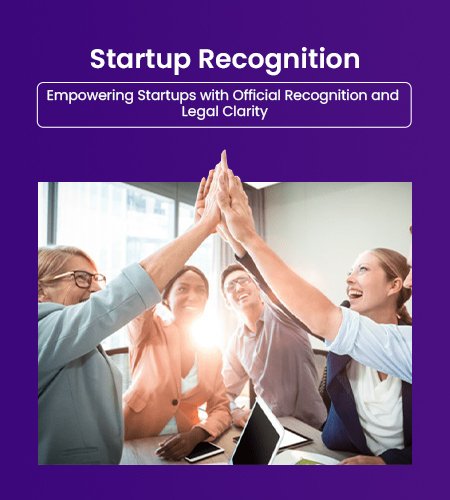
Startup Recognition
- Boost credibility with government recognition
- Access tax and compliance exemptions
- Get priority in government tenders
- Enjoy easier IP registration process
- Unlock funding and networking benefits
- Avail tax exemption on profits
- Save capital for growth initiatives
- Government recognition under Income Tax
- Gain investor trust through compliance
- Enjoy benefits for up to 3 years
Startup Support Services
Startup Recognition
Essential services and registrations for startups in India
to establish credibility and access government benefits.
DPIIT Recognition for Startups
The Department for Promotion of Industry and Internal Trade (DPIIT) under the Ministry of Commerce and Industry provides official Startup Recognition to eligible businesses in India. Introduced to foster innovation and economic growth, DPIIT-recognized startups enjoy numerous benefits like easier funding access, tax exemptions, faster IPR processing, and self-certification for compliance. To qualify, the business must be incorporated as a Private Limited Company, LLP, or Registered Partnership and should be less than 10 years old, with turnover not exceeding ₹100 crore. The entity must work towards innovation, development, or improvement of products or services and must not be formed by splitting or reconstructing an existing business.
Advantages
-
Tax ExemptionsEligible startups can avail 3-year tax holiday under Section 80IAC.
-
Self-CertificationStartups can self-certify compliance under 6 labor laws and 3 environmental laws.
-
Fast IPR ProcessingFast-track patent and trademark application with 80% rebate.
-
Access to FundingAccess to ₹10,000 crore Fund of Funds via SEBI-registered VCs.
-
Easy Winding UpStartups can wind up operations within 90 days under IBC.
-
Participation in Govt TendersExemption from prior experience or turnover criteria in govt tenders.
-
Networking OpportunitiesAccess to incubators, mentorship, and industry networking.
Disadvantages
-
Eligibility ConditionsNot all businesses qualify; strict criteria apply.
-
Compliance Burden Still ExistsSome benefits require additional procedures or filings.
-
Startup India Portal DependencyRecognition requires application via Startup India portal.
-
No Direct FundingDPIIT does not directly provide funds; routed through intermediaries.
-
Temporary RecognitionTax and other benefits are time-bound and conditional.
-
Regular Updates RequiredStartups must update records annually to retain active recognition.
-
Requires Legal FormatSole proprietorships are not eligible; only Pvt Ltd, LLP, or partnership firms.
Pitch Deck Report Preparation
A Pitch Deck is a visual and strategic presentation prepared by startups to introduce their business model, value proposition, financials, and growth plan to potential investors or stakeholders. Though not a legal registration, it plays a pivotal role in fundraising and partnership outreach. A professionally structured pitch deck includes sections such as the problem, solution, target market, business model, traction, team, competition, and financial forecasts. It must align with investor expectations in India, particularly from angel networks, venture capitalists, and government-backed incubators. A compelling pitch deck helps position the startup as credible, scalable, and worthy of funding.
Advantages
-
Investor-Ready DocumentA well-crafted deck boosts investor confidence.
-
Strategic ClarityHelps startups articulate goals and validate assumptions.
-
Helps in FundraisingEssential for approaching angel investors or VCs.
-
Attracts AcceleratorsMandatory for most incubator or accelerator programs.
-
Enables PartnershipsUsed to pitch to B2B partners, not just investors.
-
Boosts Internal AlignmentClarifies vision for team and advisors.
-
Increases ProfessionalismShows startup readiness to scale and raise funds.
Disadvantages
-
No Formal GuidelinesLack of a standardized format can confuse new founders.
-
Time-IntensivePreparing a strong pitch requires significant effort and research.
-
Subjective ImpactEffectiveness depends on pitch quality and delivery.
-
Requires UpdatesDecks must be revised frequently to reflect growth or pivot.
-
May Disclose IPRisk of revealing sensitive data without NDA protection.
-
Not Legally BindingIt's a presentation, not a substitute for legal documents.
-
Needs Expert ReviewMay require external help for refinement and design.
Registration Under Section 80IAC of the Income Tax Act, 1961
Section 80IAC of the Income Tax Act, 1961 allows eligible startups to claim a tax holiday for 3 consecutive financial years out of their first 10 years of incorporation. This benefit is available only to DPIIT-recognized startups that are registered as a Private Limited Company or LLP, not formed by splitting or reconstructing an existing business. The startup must be involved in innovation, development, or improvement of products or services and have annual turnover not exceeding ₹100 crore. Approval for the deduction must be obtained from the Inter-Ministerial Board (IMB), and the startup must file income tax returns regularly to avail of this benefit.
Advantages
-
3-Year Tax HolidayEligible startups pay zero income tax for 3 years.
-
Supports Early-Stage GrowthReduces tax burden during initial years.
-
Boosts Cash FlowSaves funds that can be reinvested in the business.
-
Recognized Under Tax LawBacked by Income Tax Department provisions.
-
Flexible ClaimingAny 3 years within 10 years can be chosen.
-
Encourages FormalizationIncentivizes registration as Pvt Ltd or LLP.
-
Promotes InnovationBenefit aimed at tech-driven and scalable startups.
Disadvantages
-
Limited to DPIIT-Recognized StartupsOnly applicable if DPIIT certificate is obtained.
-
Approval RequiredBenefit is not automatic; IMB approval is mandatory.
-
Turnover CapNot applicable if turnover exceeds ₹100 crore.
-
Only for New BusinessesNot applicable to businesses formed by reconstruction.
-
Strict Filing RequirementDelays or non-compliance can lead to loss of benefit.
-
Not Available to PartnershipsPartnership firms and sole proprietorships are excluded.
-
Scrutiny PossibleTax authorities may examine misuse or ineligibility.
Brand / Logo Registration (Trademark Registration)
Brand and Logo Registration in India is done through Trademark Registration under the Trademarks Act, 1999. This process gives a startup exclusive legal ownership over its brand name, logo, slogan, or product label. It helps protect brand identity from imitation, builds credibility in the market, and ensures long-term brand value. Any individual, startup, company, or LLP can file a trademark application online through the IP India portal. Once approved, the ® symbol can be used, indicating legal protection. Startups with DPIIT recognition enjoy a 50% government fee rebate for trademark filing. A registered trademark is valid for 10 years and is renewable indefinitely.
Advantages
-
Legal ProtectionGrants exclusive rights to use your brand or logo.
-
Brand CredibilityBuilds customer trust and market identity.
-
Nationwide ProtectionTrademark applies across all of India.
-
Asset CreationTrademarks are intangible assets that add business value.
-
Exclusive RightsPrevents others from copying your brand identity.
-
Transferable RightsTrademark can be sold, licensed, or franchised.
-
DPIIT RebateStartups receive 50% discount on government filing fees.
Disadvantages
-
Time-Consuming ProcessRegistration can take 6-12 months or more.
-
Opposition RiskOthers may oppose the trademark if similar marks exist.
-
Renewal RequiredValid only for 10 years; must be renewed periodically.
-
Application RejectionMay be rejected if mark is not distinctive or descriptive.
-
Legal CostsEnforcing trademark rights can involve litigation expenses.
-
Limited Global ScopeProtection is national unless filed under international treaty.
-
No Guarantee of GrantFiling doesn't ensure approval; examination is strict.
© ROKADH FINANCIAL SERVICES PRIVATE LIMITED

